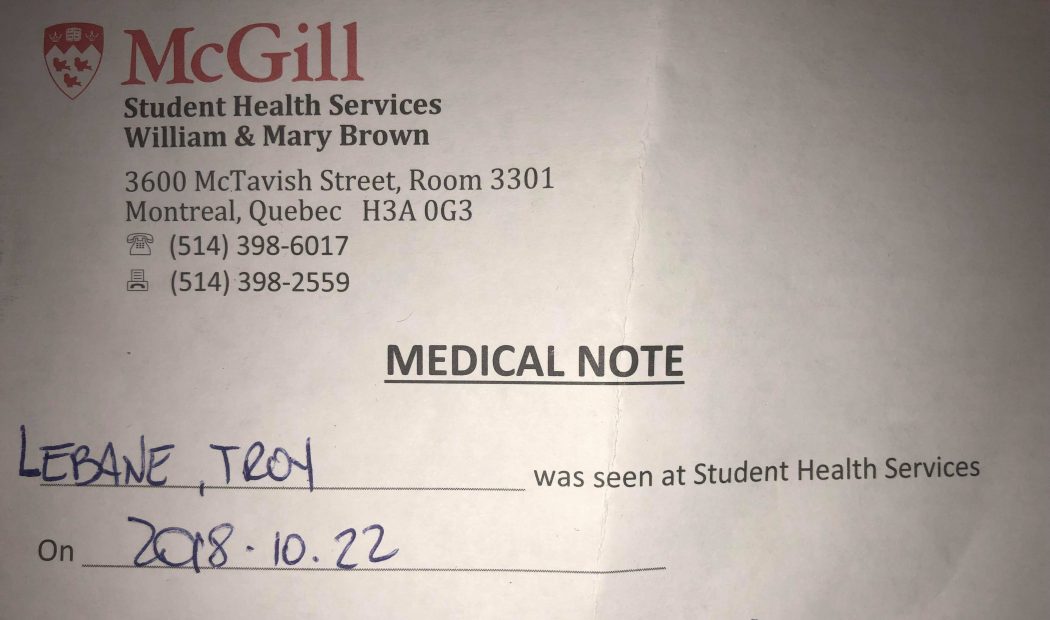Being sick always sucks. Sometimes it’s bearable, sometimes it’s not. On some sick days, going to class is an option; on others, it’s a chore to even get out of bed.
During the fall semester, I was in the latter situation. Unfortunately, one of my classes had a department-mandated policy regarding unexcused absences: each day missed translated to the loss of an entire letter grade (i.e., A- to B-). The only way to avoid this penalty was to get an official medical note, which had to reflect the date of the missed class. Below, I have recounted my experience trying to acquire one of these precious pieces of paper from the McGill Student Health Services. I hope it illustrates to our administration what sick notes truly are: an unnecessary inconvenience that should never be required to excuse an absence.
After experiencing mild cold symptoms over the weekend, I woke up on a Monday in October feeling extremely ill – certainly not well enough to go to class. I emailed all of my TAs for the classes where attendance is taken, and all of them responded wishing me a speedy recovery. However, because of the department policy for the one course mentioned above, I knew a sick note would be necessary.
I hope it illustrates to our administration what sick notes truly are: an unnecessary inconvenience that should never be required to excuse an absence.
It is not easy for students to obtain a medical note if they, like me, do not have a family doctor in Montreal. Assuming a student wakes up feeling ill and it is later than 7 AM, their position in line at McGill’s Student Health Services is already compromised by the people who were ill the day before or have a pre-booked appointment that was scheduled weeks in advance. I woke up around 10 AM and then waited on hold for 25 minutes to speak to someone at the clinic (whose website urges students to stay home and take time to recover when they have cold symptoms). I was then told that I needed to see a medical professional in person to obtain a note, but that, on account of it being 10:30am, all of the doctor appointments were fully booked for the day.
In our conversation, the receptionist mentioned that there were some nurse appointments available if I arrived there in the following few minutes. Despite feeling like I couldn’t even leave my room, I rushed to get to the clinic. Yet, after filling out a form and taking a number, I sat on a bench and waited for over an hour and a half to register for an appointment. In that time, the receptionist had gone to lunch and neglected to register several other people who were also very ill and waiting in line. Meanwhile, anyone with a pre-booked appointment for a check-up or a physical was attended to promptly and seen without delay.
When it was finally my turn to register, the receptionist informed me that all of the nurse appointments were booked for the day and that she would provide me with a list of off-campus clinics to get my medical note. Knowing that I would not be trying my luck at another public clinic if the one for McGill students could not even accommodate me, I asked the receptionist why no one had told me an hour before that all of the appointments were full. While she tried to formulate a response, someone luckily cancelled their pre-booked appointment and there was now a nurse appointment available – scheduled for over an hour later.
The slips, he said, waste the clinic’s time and resources, and they do not have enough doctors or nurses to give a medical note to every student who needs one.
After leaving the clinic and returning later, my appointment with the nurse took a total of five minutes and, as expected, I was diagnosed with a common cold. After expressing my dismay about the lengths I had to go to procure a note, the nurse informed me that the clinic had been in talks with McGill for years about removing the requirement for a medical note. The slips, he said, waste the clinic’s time and resources, and they do not have enough doctors or nurses to give a medical note to every student who needs one.
In the event that the appointment had not opened up by chance, I would have had to walk to an off-campus clinic and wait there, likely for another several hours, just for a medical professional to diagnose me with a common cold and potentially charge me upwards of $50 to write a medical note.
All in all, it took me over three hours to get a sick note – time that I could have spent actually recovering from my illness, as the clinic’s own website suggests. Additionally, just as the nurse had said, I wasted the McGill clinic’s resources and took away an appointment from someone who could have needed it more than I did (there were at least two people behind me in line).
The conventional logic says that schools require medical notes to discourage poor attendance. I understand this in elementary education because it teaches students that actions have consequences. However, university students do not need their professors and their administration policing attendance, especially if the student’s work speaks for itself. We are all young adults; if instructors actually want to stop students from skipping class, they should design their course to make it difficult for students to do well without maintaining consistent attendance.
If McGill is truly interested in student health and in the efficiency of its medical centres, it does not make sense for any professor to require a sick note. In fact, Queen’s University recently changed its policy so that a student who is ill for under three days is only required to submit a self-declaration of illness.
McGill should follow their lead and review absence policies across all of its departments. The reasons behind requiring a medical note, the difficulty of obtaining one as an out-of-province student, and the pressure it puts on Student Health Services all support the idea that is should be abolished. Hopefully, with this new policy, no one will have to interrupt their recovery to obtain a tiny piece of paper from an already-overwhelmed clinic.








